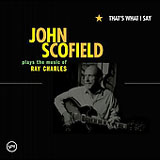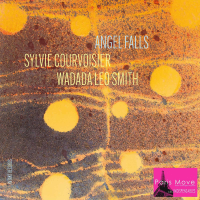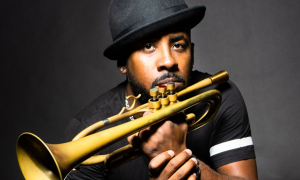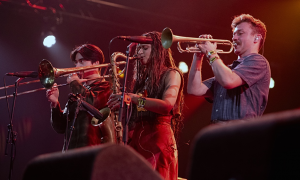Home » Jazz Articles » Live Review » Ottawa International Jazz Festival
Ottawa International Jazz Festival
Since July 1 is Canada Day, a national holiday in Canada to celebrate its birthday, the Ottawa International Jazz Festival changed the nature of its programming. Free shows were offered during the day at the Confederation Park main stage—major Canada Day celebrations were to take place during the evening on Parliament Hill only a few blocks away, so there were no main stage events that evening. Regular programming only took place at the 4 pm Connoisseur Series at Library and Archives Canada, and the final show of the 8 pm Improv Invitational Series at the National Arts Centre's Fourth Stage.
And yet, despite the relative quiet of the festival on Canada Day, there was still a choice to be made at 4 pm: whether to see pianist Lynne Arriale's Trio at the Library and Archives Canada theatre, or Canadian guitarist Tim Posgate and his Hornband, featuring tuba and baritone saxophonist Howard Johnson, in Confederation Park? I made the decision to catch Posgate and, despite a severe thunderstorm that broke up both Posgate's set and the heat wave that had settled in over Ottawa for the past couple of weeks, the quartet—which also featured trumpeter Lina Allemano and woodwind multi-instrumentalist Quinsin Nachoff—managed to squeeze in seven pieces from its recently released Tim Posgate Hornband featuring Howard Johnson.
 Like the record, the group bears some precedence in guitarist Bill Frisell's mid-'90s quartet with violinist Eyvind Kang, trumpeter Ron Miles, and trombonist Curtis Fowlkes. But while there are resemblances, there are also significant differences. Personality can often define approach and, because Tim Posgate is a more outgoing personality, his playing reflects a direct and less idiosyncratic sound—although there are also clear links to Frisell in terms of Posgate's skewed sense of humour, which imbues some of his writing and arrangements.
Like the record, the group bears some precedence in guitarist Bill Frisell's mid-'90s quartet with violinist Eyvind Kang, trumpeter Ron Miles, and trombonist Curtis Fowlkes. But while there are resemblances, there are also significant differences. Personality can often define approach and, because Tim Posgate is a more outgoing personality, his playing reflects a direct and less idiosyncratic sound—although there are also clear links to Frisell in terms of Posgate's skewed sense of humour, which imbues some of his writing and arrangements.
Before the thunderstorm descended, creating a thirty-minute break in the set, Posgate and the Hornband worked their way through his detailed arrangements of the oddly funky "Hale Bopp, the blues-informed "Muddy, and the lighter "'F' as in Fun, where Posgate traded his Fender Stratocaster for a banjo. The complexity of some of the writing manifested itself in the combination of form—where specific members of the group maintained a solid, albeit unconventional, rhythm section—and freedom for improvisation—which ranged from individuals to all three horns at once, at times. But the group managed to imply more than was actually there, as it did on the record.
 It's always a treat to hear Howard Johnson, and despite the relatively transient nature of this project—the group has three Canadian dates, is off to Europe for two festival appearances and then that's it—there was a mesh between the players that lent the impression that they've played together for considerably more time. This was even more evident in the second portion of their set, following the thunderstorm, where they worked their way through the Celtic-inflected "50% Pure Wool, which featured Johnson on pennywhistle; "How Post-Modern of Me, with its darker complexion; "Fungus, written for Charles Mingus and the only non-album composition; and the quirky roots-centric "Martin Martin Martin, which featured Posgate on lap steel guitar.
It's always a treat to hear Howard Johnson, and despite the relatively transient nature of this project—the group has three Canadian dates, is off to Europe for two festival appearances and then that's it—there was a mesh between the players that lent the impression that they've played together for considerably more time. This was even more evident in the second portion of their set, following the thunderstorm, where they worked their way through the Celtic-inflected "50% Pure Wool, which featured Johnson on pennywhistle; "How Post-Modern of Me, with its darker complexion; "Fungus, written for Charles Mingus and the only non-album composition; and the quirky roots-centric "Martin Martin Martin, which featured Posgate on lap steel guitar.
With only five performances on the tour, Ottawa was fortunate to be one of Posgate and the Hornband's stops. It was unfortunate that there wasn't a larger turnout, due to the weather and the other activities going on in the downtown core for Canada Day. Still, the musicians played to a couple of hundred as if they were playing to a couple of thousand, and they were well-received by the small but appreciative crowd.
For the final show in the festival's new Improv Invitation series, which has seen some outstanding performances, including saxophonist Evan Parker's solo concert and woodwind multi-instrumentalist Roscoe Mitchell's Quintet date, the organizers chose to close, as they opened, with some Canadian content.
Queen Mab began life as a duo with pianist Marilyn Lerner and clarinetist Lori Freedman, but more recently expanded to a trio with Dutch violinist/composer Ig Henneman. The group's music combines a chamber music sensibility and disposition to postmodern classical composition with an approach to spontaneous improvisation that often blurs the lines, making it difficult to determine when they are playing on form and when they are in free flight.
Still, there were some points where the distinction was clear. Performing a number of new compositions based on the Queen Mab Scherzo by composer Hector Berlioz, the trio also dispensed with any kind of strict instrumental roles. Henneman was just as likely to be creating a gently propulsive rhythm as she was soaring above Lerner's spare but often harmonically dense clusters. Freedman might be found playing a unison line on bass clarinet with Henneman while Lerner contributed more abstruse melodies, but was just as likely to be delivering fiery improvised phrases over Lerner and Henneman's open-ended backdrop.
Freedman was the most passionate player of the trio, with Henneman and Lerner sounding more considered. Lerner often seemed in deep concentration, hands often raised just above the keyboard as she listened to Freedman and Henneman to find just the right chord or phrase.
All three demonstrated remarkable technique, even as the music they created was by no means overtly virtuosic. All three used extended techniques to broaden the sonic potential of their instruments—Lerner using mallets to both scrape and hit the strings inside the piano; Henneman scraping her bow vertically across the strings and using the body of her violin for percussive sounds; and Freedman popping her bass clarinet a la David Murray.
At times intensely cerebral, elsewhere more purely visceral, Queen Mab was an interesting counterpoint to Evan Parker's waves of sound and Roscoe Mitchell's more Afro-centric quintet performance. And while Queen Mab was often as scripted as Norman Guilbeault's "Visions of Kerouac performance, the level of performance was considerably higher, with all three members clearly more at home in their chosen context. A fitting conclusion to a short but intriguing series that has hopefully been successful enough to encourage festival organizers to continue bringing this kind of left-of-centre music to the festival in future years.
Tomorrow: Adrian Cho Impressions in Jazz Nonet; Galaxie Jazz Youth All-Stars; and Pucho and the Latin Soul Brothers.
Visit Tim Posgate and the Ottawa International Jazz Festival on the web.
Photo Credit
Brett Delmage
Tags
PREVIOUS / NEXT
Support All About Jazz
 All About Jazz has been a pillar of jazz since 1995, championing it as an art form and, more importantly, supporting the musicians who make it. Our enduring commitment has made "AAJ" one of the most culturally important websites of its kind, read by hundreds of thousands of fans, musicians and industry figures every month.
All About Jazz has been a pillar of jazz since 1995, championing it as an art form and, more importantly, supporting the musicians who make it. Our enduring commitment has made "AAJ" one of the most culturally important websites of its kind, read by hundreds of thousands of fans, musicians and industry figures every month.





















